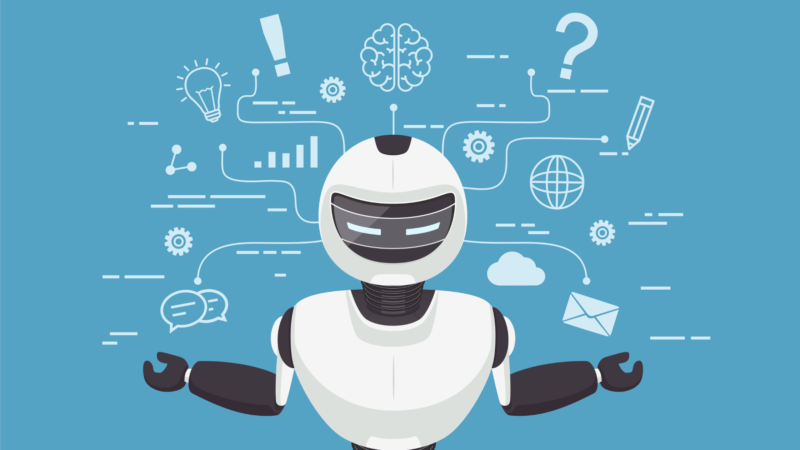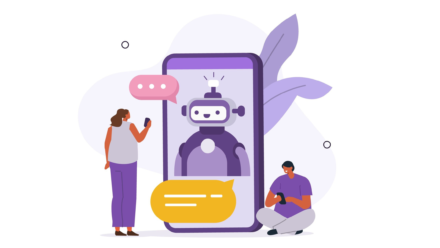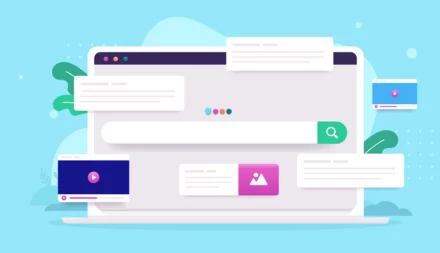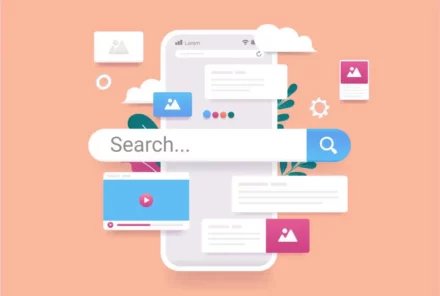AI in Digital Marketing: Friend or Foe?

Everyone’s talking about ChatGPT, but the use of AI in digital marketing is nothing new.
From SEO to Paid Search, and everything in between, there’s an AI tool that’s aimed at making our lives easier. But what do the advancements in AI really mean for the future of digital marketing?
In our webinar QueryClick’s Head of Digital Strategy, Scott Donnelly, and Head of Performance, Malcolm Gibb, discuss whether AI is a help or a hindrance for digital marketers in 2023 including:
- Why AI is important today
- What the future of digital marketing looks like
- How to use AI in digital marketing with ChatGPT
- What this means for the future of Search
Watch the full webinar – AI in Digital Marketing: Friend or Foe?
Why is AI important today?

Scott opened the webinar up by reflecting that AI is something that we use in our jobs and day-to-day lives already.
Within the digital marketing space, Google Ads has been using some form of AI and machine learning for around a decade. The Google search engine uses AI and Machine Learning to return the results that you see within SEO as part of its algorithms. And we’re quite used to the fact that it is actually driving our Paid Advertising and PPC performance.
And even here at QueryClick , our attribution software, Corvidae, uses AI and Machine Learning to help develop the process of being able to truly attribute your performance.
We also touch it every single day in some way, shape or form.
Think about your weekly Spotify recommendations – all generated by AI and based on what you’ve been listening to.
The Facebook algorithm, as well, is based on AI trying to figure out what content you do and don’t like and what you want to interact with. And even Alexa uses AI to understand and return the answers based on the input that you give to them.
To put that in context, here is a timeline for automation in Google Ads.

In the last 10 years there’s been a huge shift in evolution away from having just keyword based ads to having a real AI and Machine Learning engine at its core. With the likes of the most recent update on Performance Max campaigns.
We see that consolidating and a more AI-driven response to PPC which is only going to get even more advanced.
Is AI going to be the future of Digital Marketing?
So, one of the really big questions that’s pressing in the industry just now is – is AI actually going to be the future of digital?
Which is somewhat of a ‘yes and a no’ answer right now.

From the ‘yes’ perspective – it is clear that AI will be something that’s highly useful and is going to allow digital marketers to provide scalability. And to really help increase efficiencies of those repeatable tasks.
For example, using AI to make what we do every day a little bit quicker and a little bit easier.
It’s also going to help provide us with new data insights through things like predictive analytics. We will be able to start to glean those insights quickly through the AI system. As opposed to having to dig through trenches of data day after day.
However, in the ‘no’ column, where AI isn’t really going to replace anything with digital marketing is around the element of strategy. Which is still very much a human skill set.
AI and Machine Learning are only as good as what you can input to them. And strategy is essentially what we are going to contribute and that’s where humans are still always going to be needed.
And, clearly, experience outweighs Machine Learning.
We actually see this with some tools that exist in the SEO industry just now that make recommendations. The likes of BrightEdge and SearchMetrics, where they make recommendations based on Machine Learning but it actually takes a human with experience to qualify whether they are actually good recommendations or not.
AI and Machine Learning also lack understanding of external factors because they only know what they know. They’re not able to take into account things that are going on in either the macro economic or environmental space as well. Which means that there is always going to have to be something that humans input into strategy or digital marketing activity.
The use of ChatGPT in digital marketing
There is a lot of talk about the use of ChatGPT, which is front page news right now.
In this section, we’re actually going to go through a few use cases, potential use cases and examples of how we can actually look at ChatGPT as a tool that can drive efficiency in our daily digital marketing.
Related: 5 Ways to Use ChatGPT in Performance Marketing
Excel formulas
So first up, can ChatGPT actually generate unique or complex Excel formulas?
The answer is that it can.
In the example below, we prompt it to deliver a unique challenge by asking it to write a particular formula. In response it has given us that formula and also told us exactly how each variable works or how each part of it works. But it also works in reverse when you give it a broken formula and ask how to fix it too.

This is a very simple example, just for illustration. But it also works for things like coding or programming – where you can reverse test programming errors.
Ad creative
One of the other tools that is quite prevalent alongside ChatGPT is something called DALL-E, which is OpenAI’s image generation tool.
In fact, there are a lot of different AI tools that can generate unique art or images. There’s even tools out there that can turn static actors into speakable video actors allowing you to create your own video ads and video production as well.
For example, we can ask OpenAI’s tool to create a photorealistic character that can be used in an advertising campaign for a random supermarket brand.
Here is what it provides below:

However, it doesn’t always do well because AI is not infallible, and it’s only ever going to be as good as human input.
The reason for bringing this particular technology up, alongside ChatGPT, is that they it is very relevant in performance marketing platforms.
In fact, Meta is already implementing this kind of technology in their platforms.
So, over time, what we should start seeing is the ability to create unique imagery, ad imagery and assets on the fly. And that help us generate ads at scale.
One of the other key opportunities here is looking at personalisation of ads. Which we envisage being completely AI driven in the next few years including the fact that it will be able to create unique imagery for individuals and personas.
Related: 4 Designs Tools to Create Killer Paid Social Ads
CRO
Another way we can be potentially useful when using ChatGPT is looking at CRO and conversions.
It is worth noting here that currently ChatGPT is disconnected from the internet as its model only ran up to 2021. So, it can’t look at real-time analysis of websites or data although that’s not really that important at the moment.
What it does show is the potential for future use cases of things like CRO and conversion where we can ask it to provide analysis of potential websites. Including looking at whether we can make recommendations or conversion improvements on the site.
So, this kind of technology has a real purpose here because it can do things faster than I guess a human does it. But it still needs human input to assess, ‘Is this the right analysis? Is this the right way that we should be doing things?’.
One of the useful ways here is to obviously use ChatGPT to understand what you need to focus in on in the first place. And then take that information to then build a bigger strategy around the initial structure it provides.
Related: An Introduction to CRO
Tagging and tracking
Another useful way that we found AI and ChatGPT to be useful is for complex tagging and tracking codes. Because it cuts out the need for any development support.
We can ask ChatGPT to write a JavaScript for Google Tag Manager that sends a Facebook custom conversion event when a call-back button was clicked:

So, this provides the code, exactly how it works and where you need to put that.
So, this is the kind of application that marketers without development resource might use to their own benefit. It will also work with instructional help as well. So, we can ask, ‘what do we need to do to install GA4’ or ‘what do we need to do to install Google Tag Manager?’. And it will provide a structured response.
Google Sheets
There is an add on that we can put into Google Sheets (GPT for Google Sheets – you can find that online and you’ll need an API key to access GPT queries). This allows us to call GPT queries directly from within Google Sheets.
So, a very simple example. We asked it to provide a list of high competition keywords for the haircare sector. And then we sent out another query of creating a 90-character descriptive title for each keyword on that particular list.

Which has great application in terms of ad copy and keywords creation.
What we’ve also had a look at is how we can use it to deliver or find insights and data. Where we can actually analyse sets of data by sending queries.
Content and SEO
There’s been a lot of conversation recently around AI and how it can be used to help with things like content marketing efforts. And also SEO.
For example with ChatGPT, you can ask it to create long or short form content based on an input. Essentially based on giving it a small brief of what you want it to create.

Some of the issues that arise from this are the fact that the content has obviously been generated by somebody who’s not an expert.
So, that’s where expertise really does still play a big role. And that human element will always help separate and keep that content apart from anything that is generated by AI.
There is also the issue that there is going to be a lot of crossover in the content it can produce due to the fact that there is only so much that machines are going to be able to write and to learn. Which will potentially make web content very similar.
However, you can use AI to support more menial tasks in content creation.
So, right now we can use ChatGPT to do keyword research – for example, ask it to find a list of keywords that are related to a certain search term. The example in the image above is looking at banking software.
Related: Top 5 Keyword Research Tools to Drive SEO Performance
Some of the limitations here are, that it will just churn out a lot of semantic variations, and doesn’t provide any of the other sort of level of detail that you would normally expect to get from other SEO tools. However, it’s a really good way of generating a list very, very quickly. Based on minimal level of input.
Although it does require us to review it to make sure everything’s relevant, of course.
And, if you’re coming into a little bit of a creative block and you’re struggling to find a really exciting engaging title or hook for an article. You can use AI in order to actually create that as well.
So, it’s a really good way of trying to build a better content strategy off the back of those keywords. But you still need the human element to really turn that into something exciting. And create the content that actual users are going to want and not just search engines.
ChatGPT hints and tips
At this point Malcolm explained that, if you want to use ChatGPT at the moment, there are some tips to ensure you actually get what you need out of it.

These include:
- use specific and precise language when you’re prompting the tool which give you much better information compared to a very simple prompt
- think about how it can be used to automate repetitive low-level tasks – starting with Excel type tasks
- get used to what it CAN do and how you add human context to the results
It is about embracing the change and realising that it is going to replace you in some way.
It is also about harnessing it for performance marketing in particular which is really going to set you apart.
AI and the future of Search
And unless you’ve been living under a rock recently, you’ve probably noticed there’s been an awful lot of coverage in the news about how the big search engines, Google and Bing, are looking to actually roll out AI within their search engines.
But they’re not the first ones to do it. you.com, which is an AI search engine that you control, has been doing this since its launch in 2021.
It essentially pulls in search results from Google and Bing. It then released a new chat function – YouWrite.

Then OpenAI’s GPT 3.5 was rolled out in 2022. This was around actually being able to ask questions. So, generally some of the stuff that you see in ChatGPT but actually on the search engine platform itself.
Bing has also launched its integration with ChatGPT. Which is going to change search results in a way that means it’s actually going to start pulling information together.
And almost by magic, Google has come out and immediately announced that Bard – it’s AI element – is going to come in the next couple of weeks.
Now, what this really means for search engines or traditional SEO isn’t clear right now. But we do feel in time it’s going to completely change what we all see when we search.
So, the AI elements are going to start to provide far more personalised results and far more detailed answers to questions that we ask within the search platform itself. Which, in turn, is going to potentially have a detrimental impact on informational sites.
However, we’re going to have to continue to monitor what impact it does have, what it actually looks like and only time will tell exactly what this means for the discipline. And how we have to change our strategies to be able to actually achieve anything within that space.
Talk to us
If the topics above have given you food for thought around the potential impact of AI on your own Performance Marketing efforts then, get in touch to find out how QueryClick can help.
You can download our services brochure below, or request a call here, why not continue the discussion?
Looking to add AI into your strategy?
Find out how we can help.
Own your marketing data & simplify your tech stack.
Have you read?
I have worked in SEO for 12+ years and I’ve seen the landscape shift a dozen times over. But the rollout of generative search engines (GSEs) feels like the biggest...
As you will have likely seen, last week Google released the March 2024 Core Algorithm Update. With it, comes a host of changes aiming to improve the quality of ranking...
After a year of seemingly constant Google core updates and the increasingly widespread usage of AI, the SEO landscape is changing more quickly than ever. With this rapid pace of...



